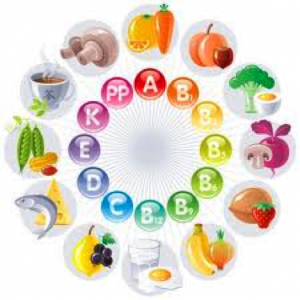Vitamins and minerals are important to helping your body function properly. Without them, you would feel sick and tired all the time.
They help to boost the immune system, support your growth and development and help your organs perform their necessary functions.
You get vitamins and minerals from food you eat or any health supplements because our bodies do not produce them naturally. Taking vitamins and minerals are an essential part of our everyday life!
TYPES OF VITAMINS
Vitamin A- This is used for body growth and repair. It is also very important in the formation of bones and tissues. Vitamin A also helps to keep your skin smooth and clear of any pimples. The best sources of Vitamin A are sweet potatoes, carrots, spinach, kale, collard greens, turnip greens, swiss chard, winter squash, mustard greens, and romaine lettuce.
Vitamin B- This vitamin is the one that gives you energy. It also helps you digest carbohydrates and helps to keep your heart and muscles stable. Vitamin B also affects your hair, skin, eyes, mouth, and your liver. The best food sources to get Vitamin B are clams, oysters, mussels, liver, caviar, octopus, fish, crab, lobster, beef, lamb, cheese, and eggs.
- Vitamin B1- Also known as Thiamine, this vitamin helps to strengthen your immune system and allows your body to adjust more comfortably to stressful situations. Common sources are asparagus, romaine lettuce, mushrooms, spinach, sunflower seeds, tuna, green peas, tomatoes, eggplant, and sprouts.
- Vitamin B2- Also known as Riboflavin, it plays a main role in your metabolism and helps to keep any mucous membranes healthy. Main sources are milk, eggs, spinach, liver, kidneys, and legumes.
- Vitamin B3- Also known as Niacin, this vitamin is a main contributor to DNA repair and the production of steroid hormones in your adrenal gland. Good sources include avocado, dates, tomatoes, leafy vegetables, broccoli and carrots.
- Vitamin B5- Also known as Panthotenic Acid, is required to release energy from sugars that are stored in your body. Foods with high amounts of B5 are legumes, cereal, meat and eggs.
- Vitamin B6- Vitamin B6 is also known as Pyridoxine. This is important in the metabolizing of your fats, carbohydrates, and amino acids. It also plays a role in creating red blood cells. You can find high amounts of B6 in spinach, bell peppers, turnip greens, garlic, tuna and bananas.
- Vitamin B7- Also known as Biotin, this vitamin is essential to cell growth, fatty acid production, and the metabolizing of fats and amino acids. Foods that contain high amounts of B7 are egg yolks, liver and leafy green vegetables.
- Vitamin B12- This vitamin has no other name but is important in red blood cell formation and the synthesis of your DNA. This vitamin mainly occurs in food that comes from animals such as beef, chicken, and lamb. Plants do not contain any vitamin B12.
Vitamin C- Vitamin C is essential to protecting your gums, teeth, and bones. It also helps repair tissue that is located anywhere in your body. It forms a protein that is used to make skin, tendons, ligaments, and blood vessels. Whenever you get a cut, it’s Vitamin C that heals the wound and creates the scar tissue. The best sources of Vitamin C are oranges, guava, red sweet pepper, kiwi, green sweet pepper, grapefruit juice, vegetable juice, strawberries, brussels sprouts, and cantaloupe.
Vitamin D- This is the most important vitamin for kids. Without this vitamin, their bones will not grow properly as they develop. In adults, osteoporosis is also caused by a lack of Vitamin D. The best sources of Vitamin D are mushrooms, mackerel, salmon, herring, sardines, catfish, tuna fish, cod liver oil, eggs, and surprisingly the sun! So if you’re low on Vitamin D, go sit out in the sun for a while and soak it all up!
Vitamin E- This is known as the “wound treating” vitamin. It’s important because it prevents any sterility and helps your blood to clot. If you don’t take enough of Vitamin E, your cells can be damaged as you get older. The best sources of Vitamin E are sunflower seeds, almonds, spinach, swiss chard, turnip greens, papaya, mustard greens, collard greens, asparagus, and bell peppers.
Vitamin K- Vitamin K is known as the “clotting vitamin”. If you did not have any of this vitamin in your system, your blood would never clot. It has also been shown to have some effect on making bones stronger in the elderly. You can get Vitamin K by eating green leafy vegetables, broccoli, fish, liver, meat, eggs, and cereal.
COMMON CONCERNS
If you’re concerned that you’re not getting enough vitamins or minerals through your current eating habit, check with your doctor or a registered dietitian. These people will help you prepare a food plan that will include all of the vitamins and minerals your body needs. However, make sure to check with your doctor before taking any health supplements since they may cause more harm then good.
Can a multivitamin make up for an unhealthy diet? Unfortunately, no. It will give you some of the nutrients your body needs but not all. Those will come only from eating healthy. It’s a common myth that if you take a multivitamin then you’ll be able to eat unhealthy. A balanced, nutritious diet is the only way to have all of the vitamins and minerals that are essential to your body.
Do I need to take a vitamin if I’m pregnant? Yes. You need to take a vitamin everyday that has 0.4mg of folic acid in it. Taking this kind of vitamin has been shown to lower the risks of your child being born with birth defects.





